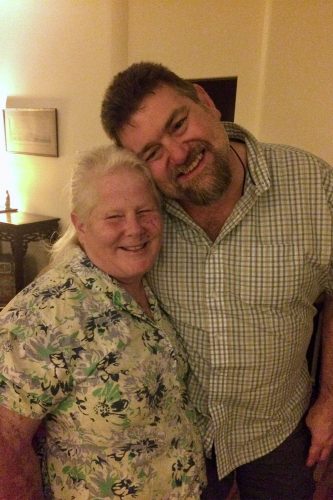
Brian Alexander was the third person to test positive for COVID-19 in Lane County. But he didn’t know he had the virus until after his wife MaryKay Alexander was already dead. She was the first person in Lane County known to have died of the novel coronavirus.
While grieving the loss of his wife of 22 years, Brian Alexander heard that coronavirus survivors could donate their antibodies, which can be extracted from plasma and used to treat those fighting the virus. He decided to donate, hoping that despite his tragic situation, it wouldn’t be too late for someone else.
In February, Brian and MaryKay Alexander attended a memorial service for MaryKay’s older brother on Mercer Island, Washington, where they were unknowingly exposed to the coronavirus.
They returned to their Eugene home on March 3. Brian Alexander woke up the next morning with a fever. He was exhausted and aching. Figuring it was a mild flu, he called in sick to work at the transportation department with Eugene’s 4J school district and took some medicine to keep the fever down.
As the week went on, Brian still felt ill, and decided to go to urgent care. At that point, his temperature had normalized. He says the doctors figured it was just an infection due to bronchitis he contracted several months ago. They gave him antibiotics and sent him home.
The doctor told him he was okay to go back to work on Monday, Brian Alexander says, so he did. He drove the bus for a few days that week. By then, the sickness was wearing off, and he was feeling better.
“Then my wife was running a fever,” Brian says. “She had a cough for a long time.” He set her up with a telehealth appointment.
On the afternoon of the appointment, Brian Alexander went to help his 60-year-old wife out of bed.
Instead of standing, MaryKay collapsed, he says. She suddenly couldn’t walk. Unable to lift her, Brian Alexander tried to reconfigure her in a more comfortable way.
That’s when she stopped breathing and turned blue.
Brian Alexander grabbed the phone and dialed 911. Under the operator’s instruction, he started chest compressions. When the paramedics arrived and started working on her, Brian says, they spent 16 minutes working to get her to breathe, tearing the room apart in their efforts.
“Apparently they got a rhythm on her,” he says. “They loaded her in an ambulance, and I got to the emergency room and waited, and waited.”
On Saturday, March 14, MaryKay Alexander died at PeaceHealth Sacred Heart Medical Center at Riverbend.
The next Tuesday, Brian Alexander got a call that his wife had tested positive for coronavirus, and they wanted to test him too. She was the first person in Lane County to die due to complications from the coronavirus.
Because he had driven the school bus recently, the district let families know he had tested positive. “They contacted like 250 families. It ended up that no one came down with coronavirus from being exposed to me,” he says.
Brian returned home to self-isolate, the loss of his wife still new. Their room was disheveled from when the paramedics tried to revive her — the mattress tossed in another area, the bedding scattered.
In his time alone, he started going through old photos of him and MaryKay, reliving memories. Brian describes his wife as giving. MaryKay was often the last one to leave a dinner party, because she wanted to help clean up. Maybe, he says, that was because she was from Hawaii, and that’s part of the culture of Aloha.
During his isolation, Brian Alexander found out that people who had COVID-19 were donating plasma to the Red Cross because hospitals were using the antibodies to help other coronavirus patients. He decided to donate.
“I want to make something out of my horrible situation,” he says. “If my plasma can help somebody, maybe that will help.”
The American Red Cross Blood Services is working closely with the FDA for those who believe they had the coronavirus and recovered, says Peter Norkeveck, donor coordinator at the Salem Red Cross. When people are interested in donating, he says, they fill out a questionnaire. Then a Red Cross representative will reach out to go over their health history and then approve them for donation — which can only take place at a permanent site in Salem or Portland.
Once what they call “convalescent plasma” is collected, it is sent to the Red Cross lab, where the antibodies are made available for various treatments around the country.
“Primarily, convalescent plasma goes to help those who are hospitalized with COVID-19. That is used to help that patient recover more quickly,” Norkeveck says. He adds they are asking those who haven’t had the coronavirus to still donate blood and platelets.
“The convalescent plasma is very much desired and in need. We need to keep our blood supply up, so I’d encourage folks to donate blood also,” Norkeveck says.
After MaryKay’s death, Brian Alexander spent time wondering if she could have made it to the hospital on time had they been tested.
“But if we had gotten her there sooner, the treatment is palliative,” Brian explains. “She would have hated dying in the hospital while hooked up to machines.”
He is back at work now, living in a widower’s fog, he says. To keep busy, he’s been playing his guitar and singing. He sings songs in Hawaiian that MaryKay loved, and he sings the song he wrote for her on their wedding day: “I Finally Found You.”
For more information on donating plasma visit RedCrossBlood.Org; if you did not test positive for COVID-19 and want to donate blood, visit RedCrossBlood.Org/Give or BloodWorksNW.Org. Bloodworks is hosting a pop-up donor center in Eugene May 14, 15 and 21 at Elements Health Club in Eugene.